|
|
|
Sort Order |
|
|
|
Items / Page
|
|
|
|
|
|
|
| Srl | Item |
| 1 |
ID:
119060
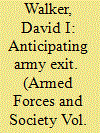

|
|
|
|
|
| Publication |
2013.
|
| Summary/Abstract |
There is recent concern about what becomes of Armed Forces leavers. This is most apparent among leavers themselves and is a feature of short careers that compel individuals to find replacement jobs and lifestyles. Concern for one's civilian future rises to prominence in the preexit period and is confronted in resettlement processes during this time. Based on qualitative analysis of interviews with twenty-eight UK regular Army career soldiers and officers, the article argues that the final year of service-though mostly a practical endeavor-is also an important time for tackling matters of identity. The work is underpinned theoretically by a combination of Mead's pragmatism and Ricoeur's hermeneutics and constructs a typology of preexit orientation. This is an approach that casts some doubt about the utility of projecting oneself into unknown civilian futures from the context of distinctive and familiar Army relations.
|
|
|
|
|
|
|
|
|
|
|
|
|
|
|
|
| 2 |
ID:
102779


|
|
|
| 3 |
ID:
159814
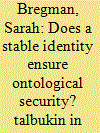

|
|
|
| 4 |
ID:
185584
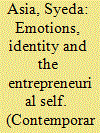

|
|
|
|
|
| Summary/Abstract |
This article explores the relationship between emotions, identity and work in the narratives of Muslim women in rural Jhunjhunu, Rajasthan, India. The article uses an in-depth account of two families where all women engage in income generating work. The women experience complex challenges, struggles and negotiations, and they make remarkable decisions in resolution. The role their emotions play in their decisions articulates an entrepreneurial self that offers a newer interpretation of the relationship between emotions, identity and work. By detailing their struggles, negotiations and remarkable decisions, this article attempts to move towards a sociology of hope that marks the spirit of these women in overcoming the constraints in their everyday.
|
|
|
|
|
|
|
|
|
|
|
|
|
|
|
|
| 5 |
ID:
190784
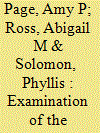

|
|
|
|
|
| Summary/Abstract |
Previous research indicates that one’s identity relates to one’s use of specific coping strategies. Exploring the relationship between self and coping in military wives is crucial to understanding how they manage military lifestyle-related stressors. The researchers hypothesized that identity status, self-concept clarity, self-monitoring, mastery, and role conflict will be related to choice of emotion-focused coping or problem-focused coping strategies. Two hundred two participants completed an anonymous online survey containing standardized scales. Ordinary least squares (OLS) regression analyses revealed that emotion-focused coping had positive relationships with achieved identity status and role conflict. Problem-focused coping had positive relationships with moratorium status, self-concept clarity, self-monitoring, and mastery. Findings provide preliminary support that sense of self is important in understanding how military wives choose to cope with particular challenges.
|
|
|
|
|
|
|
|
|
|
|
|
|
|
|
|
| 6 |
ID:
170178
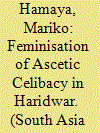

|
|
|
|
|
| Summary/Abstract |
Case studies of male–female ascetic couples in Haridwar in North India complicate the widespread knowledge that male Hindu renouncers are supposed to observe celibacy. Based on extended ethnographic work, this article investigates specifically how female ascetics tackle the dominant androcentric discourses and practise celibacy from a female point of view, focussing on their practice of sevā or spiritual service. The article argues that while female ascetics do not object to the androcentric ideology of celibacy, they follow it only partly, switching their focus from sexual abstinence to devotional sevā. Doing this, female ascetics value controlling emotion more than controlling sexual desire. Through the practice of sevā, they aim for fostering an attitude of devotion as a feminised manifestation of their efforts towards reaching spiritual attainment.
|
|
|
|
|
|
|
|
|
|
|
|
|
|
|
|
| 7 |
ID:
184579
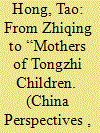

|
|
|
|
|
| Summary/Abstract |
This paper mobilises interactionist sociology to explore the biographies and moral careers of two former zhiqing who emerged, circa 2007, as well-known mother figures in a dynamic tongzhi blogosphere. Their encounter with young tongzhi inaugurated parental advocacy for their sexually nonconforming children in China. By anchoring tongzhi activism in contemporary Chinese history and reconstructing two parallel processes of activist-becoming, this paper seeks to better understand how political agency emerged in an authoritarian setting while making a case for studying activism as historicised meaning-making activities.
|
|
|
|
|
|
|
|
|
|
|
|
|
|
|
|
| 8 |
ID:
115197
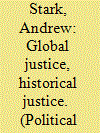

|
|
|
|
|
| Publication |
2012.
|
| Summary/Abstract |
The debates over global and historical justice much preoccupy contemporary political theory. Yet they have not been analyzed in tandem. And this, despite the fact that a number of theoretical frameworks, principal among them contractarianism and utilitarianism, configure arguments in both debates. In this essay, I show that such arguments, as advanced by either side in each of the two debates, all rest on a set of patterned assumptions about the nature of the self. Specifically, I argue, the debates over historical and global justice resemble each other as parallel contests over the physical, meta-social, metaphysical and social natures of the self. At their cores, the debates over historical and global justice thus display a common and symmetrical structure. I will also show that certain conceptions of the self underlying both the anti-historical justice and the anti-global justice positions are mutually inconsistent. Similar contradictions do not beset the pro-historical and pro-global justice positions.
|
|
|
|
|
|
|
|
|
|
|
|
|
|
|
|
| 9 |
ID:
157740
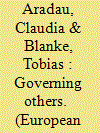

|
|
|
|
|
| Summary/Abstract |
As digital technologies and algorithmic rationalities have increasingly reconfigured security practices, critical scholars have drawn attention to their performative effects on the temporality of law, notions of rights, and understandings of subjectivity. This article proposes to explore how the ‘other’ is made knowable in massive amounts of data and how the boundary between self and other is drawn algorithmically. It argues that algorithmic security practices and Big Data technologies have transformed self/other relations. Rather than the enemy or the risky abnormal, the ‘other’ is algorithmically produced as anomaly. Although anomaly has often been used interchangeably with abnormality and pathology, a brief genealogical reading of the concept shows that it works as a supplementary term, which reconfigures the dichotomies of normality/abnormality, friend/enemy, and identity/difference. By engaging with key practices of anomaly detection by intelligence and security agencies, the article analyses the materialisation of anomalies as specific spatial ‘dots’, temporal ‘spikes’, and topological ‘nodes’. We argue that anomaly is not simply indicative of more heterogeneous modes of othering in times of Big Data, but represents a mutation in the logics of security that challenge our extant analytical and critical vocabularies.
|
|
|
|
|
|
|
|
|
|
|
|
|
|
|
|
| 10 |
ID:
157875
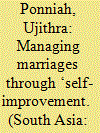

|
|
|
|
|
| Summary/Abstract |
There has been a rise in the availability and consumption of ‘New Age’ spiritualities in urban India. I focus on one such self-care practice, Reiki, in a heterogeneous Delhi neighbourhood, and the engagement of urban upper-caste women from middle-class joint families with it. I argue that Reiki classes can be read as a site for the formation of gendered subjectivities. There are four kinds of interpersonal problems women discussed in Reiki classes: one's well-being in families, divorces, problems with mothers-in-law and material success. Through the habitualisation of positive thoughts, maintaining cosmic balance and managing one's ‘life-energy’, women were taught to take control of their lives within the constraints of familial situations. Through a focus on the self, these practices re-teach women to adapt happily by visualising the intimacies they desire, articulating their anxieties and imagining newer ways of ‘doing’ marriage. I argue that practices like Reiki disempower women through a language of self-responsibilisation. Self-healing strategies like Reiki therefore function both as a ‘technology of the self’ and as an extension of the adaptable Hindu joint family.
|
|
|
|
|
|
|
|
|
|
|
|
|
|
|
|
| 11 |
ID:
133828
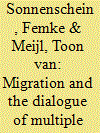

|
|
|
|
|
| Publication |
2014.
|
| Summary/Abstract |
This article examines the cultural dilemmas proceeding from the multiple identifications of Kurdish migrants working in the multicultural environment of Istanbul's tourist industry. Since identifications invariably multiply when migrants enter multicultural environments, the question emerges how migrants cope with increasing identifications? How are multiple identifications related within the self? In this article, these questions are addressed, first, by analysing how Kurds explain ethnic stereotypes of themselves with reference to migration from the region of origin. Furthermore, conflicts and ambiguities between identifications as individual migrant and identifications as family member are investigated. Third, identifications of the 'villager' versus the 'urbanite' are reviewed, while, finally, the role of 'learning' in the migration process for Kurdish identifications will be highlighted. Dialogical self theory is used to situate the analysis of cultural dilemmas and contradictions of Kurdish migrants in Istanbul within the broader study of multiple identifications of migrants in multicultural societies.
|
|
|
|
|
|
|
|
|
|
|
|
|
|
|
|
| 12 |
ID:
101383


|
|
|
|
|
| Publication |
2010.
|
| Summary/Abstract |
In an attempt to broaden our perspective on IR theory formation, this article seeks to highlight the significance of ideology. Consistent with the recently revived sociology of knowledge tradition in international studies, we view IR scholarship as grounded in certain social and ideological conditions. Although some scholars have studied the political, ideological, and epistemological biases of Western, particularly American, civilization, in order to achieve a better understanding of global patterns of knowledge formation it is important to look at cases beyond the West. We therefore look at the formation of IR knowledge in Russia, and we argue that the development of a Russian theory of international relations responds to the old debate on the 'Russian idea,' and three distinct ideological traditions that had been introduced to the national discourse in the mid-19th century. Focusing on theories and concepts of the international system, regional order, and foreign policy, as developed by Russian scholars, we attempt to demonstrate how they are shaped by ideological and therefore pre-theoretical assumptions about social reality.
|
|
|
|
|
|
|
|
|
|
|
|
|
|
|
|
| 13 |
ID:
159393
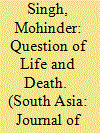

|
|
|
|
|
| Summary/Abstract |
This paper is based on a reading and an interpretation of Swami Shraddhanand's Hindi autobiography, published in 1924. In it, Shraddhanand centrally narrates the story of his conversion to the Arya Samaj and his self-transformation in the second half of the nineteenth century. Through a close reading of the conceptual terminology embedded in the text, the paper attempts to show that the conversion being narrated here cannot be understood by referring to the category of religion alone, and that the identity that the protagonist discovers for himself—his new Arya identity—is a composite civilisational-religious identity that involves transformed ideas of religion and religiosity.
|
|
|
|
|
|
|
|
|
|
|
|
|
|
|
|
| 14 |
ID:
192949
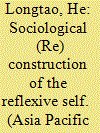

|
|
|
|
|
| Summary/Abstract |
The emergence of a body of work on ethics since the 1990s with a special interest in the self in the Western academia, inspired by Michel Foucault's earlier work, resonates with a concomitant renewed scholarly interest in classical Confucian ethics both in China and internationally. An emphasis on culture and the rejection of a Euro-centric universalist self in these bodies of work accompanies the disavowal of the very possibility of a generic reflexive self. This article seeks to critically examine the ontological positions on the self of these bodies of work, of Foucault's later thoughts, and of classical Confucian ethics. It is argued that there is a theoretical affinity between Foucault's later thoughts and classical Confucian ethics, with both philosophers acknowledging reflexivity as a universally inherited nature of self and making a special consideration of cultural equality and commonality. The examination includes advocacy for a more nuanced approach to notions of cultural equality that relies on targeted research and intercultural dialogue to avoid any predetermining of cultural differences, to allow better-informed appreciation of differences, and to develop a more dynamic conceptualization of culture. This article concludes by initiating a discussion about the design of an integrated approach to cultivate reflexivity through training practices that bring together Foucauldian and Confucian ideas.
|
|
|
|
|
|
|
|
|
|
|
|
|
|
|
|
| 15 |
ID:
151203
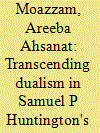

|
|
|
|
|
| Summary/Abstract |
Glorification of ‘self’ (Western civilisation) at the expense of the ‘other’ (eight civilisations) was inherent in Huntington’s Clash of Civilizations thesis. The ‘other’ civilisations identified—as the non-self and situated mostly in the Global South—were clubbed together as the Rest, irrespective of their pluralism. Building on Huntington’s binaries—the West and the Rest—this article makes an attempt to reflect on similarities within the perceived differences. Even though his civilisations appear different, they are in many ways similar due to interactions, colonisation and globalisation. Their relationship has become complicated; Western civilisation cannot do without civilisations from the Global South. Hence, there can be no perpetual or fixed enemy nor can all relationships be suspended with the ‘other’ in a globalising world.
|
|
|
|
|
|
|
|
|
|
|
|
|
|
|
|
| 16 |
ID:
143561
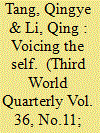

|
|
|
|
|
| Summary/Abstract |
This study, drawing upon J. R. Martin’s appraisal theory, examines the discursive representations of self in a corpus of in-depth interviews with 15 Chinese old-generation migrant workers. Migrants represent self as aliens, outlanders, the suppressed and socially excluded, but with strong self-awareness and a definite self-categorisation. This study has implications for removing the stigma and stereotype against this group and enhancing their power of discourse. Also, with the voice being heard, the marginalised have the opportunity to resist forced identity and to contribute to building a bridge of sympathy, empathy, respect and understanding between the powerful and the powerless.
|
|
|
|
|
|
|
|
|
|
|
|
|
|
|
|
|
|
|
|
|